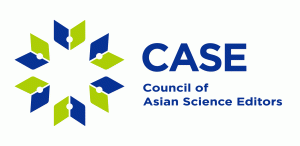Council of Asian Science Editors
- About CASE
- Resources
- Events
- The 8th Asian Science Editors’ Conference and Workshop 2024
- The CASE Webinar: Peer Review for Open Science
- The 7th Asian Science Editors’ Conference and Workshop 2022
- The 6th Asian Science Editors’ Conference and Workshop 2020
- The 5th Asian Science Editors’ Conference and Workshop 2018
- The 4th Asian Science Editors’ Conference and Workshop 2017
- The 3rd Asian Science Editors’ Conference and Workshop 2016
- The 2nd Asian Science Editors’ Conference and Workshop 2015
- Asian Science Editors’ Conference and Workshop 2014
- Membership
- Notices
- Announcement
- Photo gallery
- Asian Science Editors’ Conference and Workshop 2014
- The 2nd Asian Science Editors’ Conference and Workshop 2015
- The 3rd Asian Science Editors’ Conference and Workshop 2016
- The 4th Asian Science Editor’s Conference and Workshop 2017
- Joint Convention of the Asia Pacific Association of Medical Journal Editors and the 5th Asian Science Editors Conference & Workshop 2018
- The 6th Asian Science Editors Conference and Workshop 2020
- The 7th Asian Science Editors’ Conference & Workshop 2022
- Related link
Unites States’ public access policy and Plan-S in Europe: Do they affect the Asian journal publishing?
Sun Huh (Hallym University, Korea)
In December 16, 2019, there was an article in Scholarly Kitchen posted by Robert Harington, Associate Executive Director, Publishing at the American Mathematical Society [1]. He said that “Let’s assume we now live in the post-apocalyptic world of a zero-embargo policy for federally funded research. What does this mean for the publishing of scholarly articles and their authors?” He said that “In mathematics, the field in which he works, this is likely to account for roughly 25% of articles published.” Although it is still not enacted, there may be an enactment of immediate open access publication without embargo period for articles supported by Federal funding agencies for example, National Science Foundation or National Institute of Health.
In Europe, “all scholarly publications on the results from research funded by public or private grants provided by national, regional and international research councils and funding bodies, must be published in open access journals without embargo from 2021” according to Plan-S [2]. There are also criteria to be eligible open access journal. Basic requirement are as follows: keeping Committee of Publication Ethics (COPE) guideline; announcement of basic statistics; copyright owned by authors or institutes; immediate and permanent open access policy. The mandatory requirement are as follows: permanent ID such as digital object identifier (DOI); digital archiving; providing article level metadata; and machine-readable information on the open access status and the license.
Can Asian journals fulfill above conditions or criteria? First, immediate open access without embargo is easy to be fulfilled because most scholarly journals have been published as open access without embargo period in Asia, because scholarly journals have been published by academic societies or non-profit organization. In Asia, there was rare widely known commercial scholarly publishing companies. At now, most famous commercial journal publishing companies are based in North America or Europe. Therefore, scholarly journals are for non-profit in Asia. It is easy environment for Asian journals to be promoted to higher brand journal if manuscript supported United States federal fund are submitted to Asian journals which have no article processing charge or a minimum amount of article processing charge.
As for Plan-S, most basic and mandatory requirements can be fulfilled by Asian journals without difficulties. However, the copyright is the problem. Asian journals are usually academic society journals. The society has provided the publication fee with support by Government’ fund, sponsorship, membership fee, or minimum amount of article processing charge. According to copyright law, society usually owned copyright of the articles of her journal. Plan-S’s the first principle is “authors or their institutions retain copyright to their publications.” This principle is difficult be revised for the consideration of Asian society journals. It is the barrier for Asian journals to be able to receive the manuscript from Europe supported by European funding bodies.
Asian journals have still lower brand power than European or North American journals which have been usually published by large commercial publishing companies. If Plan-S becomes mandatory from 2021, there may be more chance for open access commercial companies that have policy of copyright ownership by authors. They can receive enough article processing charge from authors to maintain their journals.
We, Asian editors should consider to transfer copyright to authors or their institutes if we would like to receive manuscripts from Europe supported by European funding bodies. It is time for us to decide to have or have not copyright. Furthermore, we should contact Government officials if they also have a plan to introduce public access or open access policy of Government supported articles. In those case, we should be able to discuss on the copyright issue carefully.
Conflict of interest: None.
References
- Harington R. Politics and open access [Internet]. Mount Laurel (NJ): Society for Scholarly Publishing; 2019 Dec 16 [cited 2019 Dec 26].
Available from: https://scholarlykitchen.sspnet.org/2019/12/16/politics-and-open-access/ - Science Europe. Plan-S Principles and implementation [Internet]. Brussels, Belgium: Science Europe 2019 [cited 2019 Dec 26].
Available from: https://www.coalition-s.org/addendum-to-the-coalition-s-guidance-on-the-implementation-of-plan-s/principles-and-implementation/
